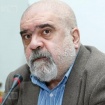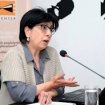Possibilities and Understanding of the Karabakh Conflict Resolution 25 Years after the Ceasefire : Page 7 of 10
a compromise. But this is in the ideal case scenario. In reality, we see that everything is much more prosaic and worse, that there is no respect and trust, but there is a desire to achieve his objective and force the other side to make concessions. Therefore, for a quarter of a century, both sides only blackmailed each other. Blackmail hasbeen applied by the mediators, too, who either subtly or explicitly demonstrate this. That is to say, blackmail isunfortunately a part of the negotiation process.
Karabakh Conflict in theDoestic Political LandscapeContext
Sergey Markedonov – I think it is time to return to Laura Baghdasaryan’s thesis that "with Pashinyan coming to power, he became particularly acutely used as a factor in the domestic political struggle." There is something to consider here. In his recent speech, where the Prime Minister of Armeniadeclared the “second most important stage of the revolution”, the situation in Karabakh was actually put on a par with the judicial reform (“surgical intervention in the judicial system” if we quotePashinyan’sevaluation). That is the rub!Just like Karabakh, which for decades has been a national symbol for Armenia, is a kind of myth (not to be confused with fairy tales, here the audience is enlightened, and understands what is going on). And suddenly, today, many people speak of the NKR as a kind of "Armenian Vendée." And also, it is time to speak about the complex dialectical relations between Yerevan and Stepanakert. On the one hand, Karabakh is the most important national symbol of the post-Soviet Armenia and a point of consensus among the main political forces. On the other hand, Yerevan has quite frequently looked at Stepanakert as an oppositional force, whicheven claims to be the best entity to voice Armenian interests ... It is not excluded that democracy will come to Karabakh and the power will become more open, more dynamic, unlike B. Sahakyan (Editor–the President of the NKR), who has been in office since 2007! But this will not lead to fundamental changes in the relations with Baku. This is what should be borne in mind by the supporters of the "transitionapproach."
Alexander Iskandaryan - The question is extremely interesting. But it has to do with relations and matters within the Armenian circles, it is not about either the settlement or the non-settlement of the conflict. It is about the continuation of the transit of elites in the Armenian societies. The tradition in the "Armenian world" has set a requirement for the leaders of Karabakh and Armenia for a sort of compatibility. The Russian word does not reflect the meaning in English it is better "compatible". Currently this is not the case. Just as the transit hapenedfirst in the executive power, followed by the legislative branch, and intermittently in the local authorities too, now the turn of the judiciary has come to be followed by the fourth power, if there is still sufficient drive and power, and so on. A change of the mode of interaction between Armenia and Artsakh should also occur. It is not easy thing, because we







 +37410 563363
+37410 563363
 1/3 Buzand Str, 8 Floor, Yerevan, Armenia
1/3 Buzand Str, 8 Floor, Yerevan, Armenia